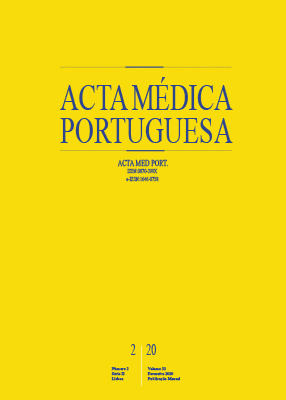Exploratory and Confirmatory Validation of the Connor-Davidson Resilience Scale (CD-RISC-10) in a Sample of Individuals Registered in Job Centers
DOI:
https://doi.org/10.20344/amp.12243Keywords:
Portugal, Psychometrics, Resilience, Psychological, Surveys and QuestionnairesAbstract
Introduction: Bonanno defined resilience as the individual’s capacity to cope with traumatic events, namely, the ability to maintain the levels of physical and psychological functioning relatively stable. The aim of this study was to evaluate the psychometric properties of 10-item Connor-Davidson resilience scale. The Connor-Davidson resilience scale short version has good psychometric qualities (Cronbach α – 0.85) when compared with the long version (Cronbach α – 0.89).
Material and Methods: We obtained a convenience sample of individuals registered in job centers which was randomly divided into two subsamples (sample 1 = 5127 and sample 2 = 5114). We applied the principal component analysis in sub-sample n1. With subsample n2 a confirmatory factorial analysis was performed using the maximum likelihood method. We used the multigroup analysis to compare the factorial model between genders and professional situation. We performed a convergent and discriminant analysis through Pearson’s correlation analysis.
Results: The principal component analysis extracted one factor with an explained variance of 53.97%. The confirmatory factor analysis confirmed the unidimensionality of the scale. The invariance between genders and professional situation was confirmed. The Connor-Davidson resilience scale correlated positively with the SF-36 scale and negatively with the GHQ-12 scale.
Discussion: The exploratory and confirmatory analysis revealed one dimension, and good psychometric properties, which is similar to the original 10-item scale.
Conclusion: To our knowledge, this is the first validation study of this scale among the Portuguese population (Portugal). Its results are highly satisfactory, and its use is recommended among the Portuguese population.
Downloads
Downloads
Published
How to Cite
Issue
Section
License
All the articles published in the AMP are open access and comply with the requirements of funding agencies or academic institutions. The AMP is governed by the terms of the Creative Commons ‘Attribution – Non-Commercial Use - (CC-BY-NC)’ license, regarding the use by third parties.
It is the author’s responsibility to obtain approval for the reproduction of figures, tables, etc. from other publications.
Upon acceptance of an article for publication, the authors will be asked to complete the ICMJE “Copyright Liability and Copyright Sharing Statement “(http://www.actamedicaportuguesa.com/info/AMP-NormasPublicacao.pdf) and the “Declaration of Potential Conflicts of Interest” (http:// www.icmje.org/conflicts-of-interest). An e-mail will be sent to the corresponding author to acknowledge receipt of the manuscript.
After publication, the authors are authorised to make their articles available in repositories of their institutions of origin, as long as they always mention where they were published and according to the Creative Commons license.









